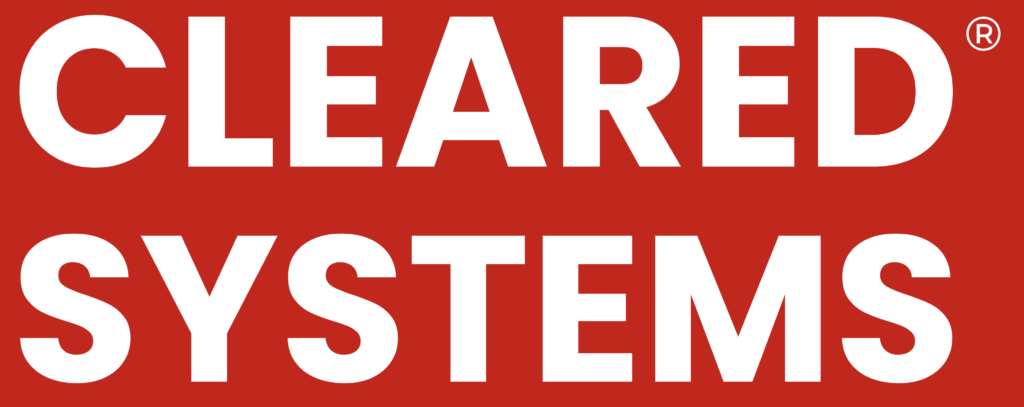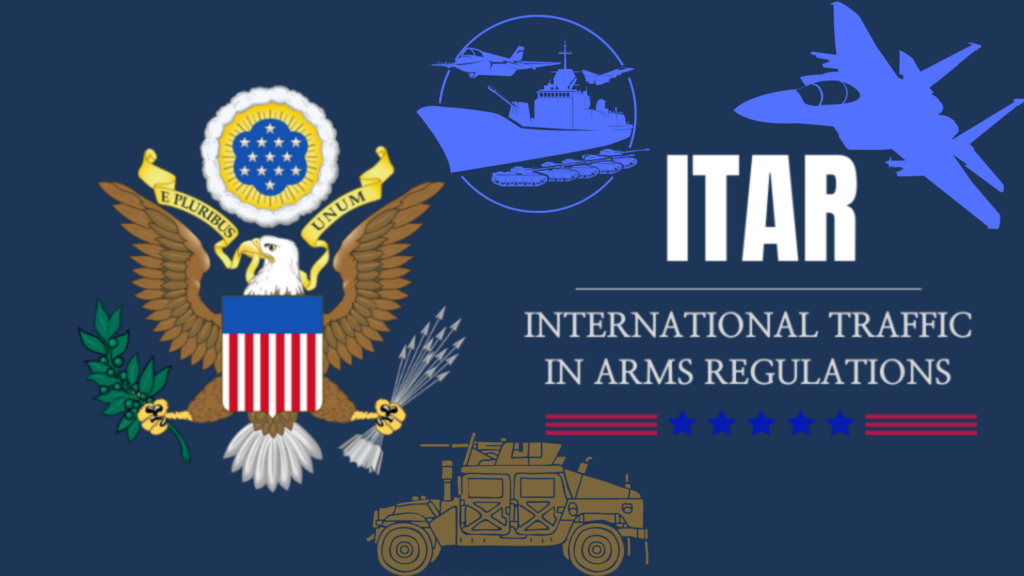What do weapons, acoustic sensors, ballistic missiles, and other defense technologies share? All of them are regulated under the International Traffic in Arms Regulations (ITAR). This complex set of regulations governs the export of defense-related services, data, and technologies. Contractors in the defense and aerospace sectors must adhere to the ITAR. Compliance with the rules is a legal obligation and a critical measure of our national security and foreign policy. ITAR ensures the US maintains a strategic advantage in national defense and protects sensitive technologies from the wrong hands. Unfortunately, although compliance with the ITAR is critical for protecting sensitive defense technologies, it can be challenging for contractors to meet. This is where cybersecurity companies and export control experts like Cleared Systems can significantly help.
So, who should comply with the ITAR? How can companies strengthen their compliance postures with enhanced organizational awareness and security?
What is the ITAR?
This is a set of US government regulations that govern the export of defense items under the Arms Export Control Act (AECA). Its primary aim is to prevent the unauthorized transfer of sensitive military technologies to foreign entities or persons. The United States Munitions List (USML) identifies three primary categories of defense-related items that are regulated under ITAR, including;
- Defense articles: This refers to any item or technical data designed, developed, or modified specifically for military, satellite, missile, or other controlled use provided on the USML.
- Defense Services: Any training or assistance in the design, installation, manufacture, repair, or operation of a defense article. This includes any formal conversations or collaborations on the related technical data.
- Technical Data: Any information that relates to the design, production, operation, testing, maintenance, or modification of a defense article. It includes things like drawings, maintenance manuals, assembly instructions, etc. However, technical data doesn’t include general scientific or engineering principles or information in the public domain.
The USML is a long and detailed list that includes items like shotguns, ammunition, aircraft, guided missiles, chemical agents, torpedoes, and spacecraft, among others. Governing the export of items listed on the USML is aimed at helping protect national security and ensuring that crucial technologies don’t fall into the wrong hands.
What are the Key Components of ITAR Compliance?
Organizations need a robust ITAR compliance program to ensure trust among stakeholders and adhere to regulatory requirements. The DDTC issued the ITAR Compliance Program Guidelines that set out DDTC’s expectations for an effective ITAR Compliance Program (“ICP”) and an introduction to controls contained in the AECA and ITAR. Below are the main elements of ITAR compliance.
Registering With the DDTC
Those engaging in ITAR-controlled activities are required to register with the DDTC and obtain the necessary license to export defense technical data and items listed on the USML.
Export Classification
Export control classification is a crucial aspect of the compliance process. Companies must categorize their products and technical data according to the USML categories to ascertain if they fall under ITAR, including:
Category I: Firearms and related articles
Category II: Guns and armament
Category III: Ammunition and ordnance
Category IV: Launch vehicles, guided missiles, ballistic missiles, rockets, torpedoes, bombs, and mines
Category V: Explosives and energetic materials, propellants, and incendiary agents
Category VI: Surface vessels of war and special naval equipment
Category VII: Ground vehicles
Category VIII: Aircraft and related articles
Category IX: Military training equipment
Category X: Personal protective equipment
Category XI: Military electronics
Category XII: Fire control, laser, imaging, and guidance equipment
Category XIII: Materials and miscellaneous articles
Category XIV: Toxicological agents, including chemical agents
Category XV: Spacecraft
Category XVI: Nuclear weapons-related articles
Category XVII: Other classified articles, technical data, and defense services
Category XVIII: Directed energy weapons
Category XIX: Gas turbine engines
Category XX: Submersible vessels
Category XXI: Other articles, technical data, and defense services
Companies must secure appropriate export or temporary import licenses and adhere to specific, rigorous documentation protocols based on these classifications.
Technical Data Protection
A key challenge in ITAR compliance is safeguarding technical data. The 2020 Encryption Rule permits some technical data to be stored or processed internationally without export registration, but robust cybersecurity measures are essential to prevent unauthorized access by non-U.S. persons. Under the ITAR Encryption Rule, organizations can use end-to-end encryption with FIPS 140-2 compliant modules to secure unclassified technical data in transit. For stored data on servers or cloud platforms, independent encryption is necessary to prevent access by administrators or cloud providers.
Who Needs to Comply With the ITAR?
Any US national or organization involved in the export, manufacture, or distribution of any item(s) listed on the USML must achieve compliance with the ITAR. This usually includes companies in the ammunition, aerospace, weapons, and nuclear power industries. However, it can also include technology companies focusing on automation and robotics, among other related technologies. In a nutshell, ITAR applies to the entire military supply chain, impacting chemical suppliers, wholesalers, component manufacturers, researchers, brokers, etc. The State Department’s DDTC manages the list of companies that can deal in USML goods and services. It is up to each company to establish policies to comply with ITAR regulations.
The ITAR does not govern non-defense-related exports. Instead, such exports are typically regulated by the US Department of Commerce’s Bureau of Industry and Security (BIS) under the Export Administration Regulations (EAR). Currently, over 13,000 businesses in the US must comply with ITAR regulations. The scope of ITAR extends internationally, requiring any foreign entity handling U.S.-origin defense-related items or data to adhere to its rules. While some temporary exemptions exist, ITAR regulations are generally stringent about compliance.
What are the Penalties for ITAR Non-Compliance?
What happens if you don’t comply with ITAR? Cleared Systems avers that you should do everything to avoid this situation. ITAR compliance requires a business to follow the 22 CFR Parts 120-130 regulations and remain updated on any amendments. ITAR violations carry significant repercussions, including potential criminal penalties and civil fines for non-compliance. The severity, type, and scope of violations can vary, but here are some general guidelines to be aware of regarding ITAR violations:
- Business Disruption: Being sanctioned or penalized for ITAR compliance violations is scary for any company. One of the consequences is the disruption that might erupt across your business. Due to audits and proceedings, your organization might start experiencing delayed shipments. Unfortunately, that could damage your brand’s reputation, resulting in long-term impacts.
- Loss of Export Licenses (Debarment): ITAR compliance violations may result in loss of export license, meaning that companies might lose their ability to conduct business as government contractors.
- Business Fines: ITAR violators can be fined up to $1 million per violation. These fines are levied against the business entity and can substantially impact the company’s ability to compete in the market.
- Criminal Penalties: Some violations are more harmful than others. Thus, individuals contravening the ITAR may experience different criminal penalties, including a fine of $1 million and imprisonment of up to 10 years, or both, per violation.
- Civil Penalties: At any time that it is determined an individual has violated the ITAR, the Secretary of State may choose to apply a civil penalty. Violators can expect a civil fine of up to $500,000 per violation in this case.
Thus, defense article exporters must have sufficient infrastructure to maintain ITAR compliance. These resources should ensure that organizations or their employees don’t violate even a single ITAR requirement, unintentionally or willfully. Whenever you determine a violation, the DDTC encourages you to self-report the occurrence promptly. Cleared Systems helps organizations register with the DDTC, apply for the required licenses, secure ITAR-controlled technical data, and train employees on ITAR best practices. All this is aimed at ensuring you never have to deal with the above repercussions, penalties, or ITAR violations.
ITAR Compliance Best Practices
The ITAR is a complex set of regulations, and navigating it can be daunting, particularly for SMBs and SMEs, as they need more resources. However, there are measures that Export compliance experts like Cleared Systems can undertake to help your organization achieve compliance.
- Employee Training for ITAR Compliance: Ensuring ITAR compliance requires companies to invest in comprehensive staff training and the necessary infrastructure. Regular training sessions and employee education programs are vital for fostering an organization’s compliance culture, regardless of the specific regulations involved.
- Consult ITAR Compliance Experts: Seek guidance from legal experts specializing in regulatory compliance to navigate the complexities of ITAR effectively. Experienced compliance officers or consultants can provide valuable insights and best practices tailored to your industry.
- Regular ITAR Audits and Reviews: Regular audits and reviews are essential for maintaining ITAR compliance. Systematically assess and document your export control processes, classification of controlled items, export licensing, and technology transfer protocols. Identifying potential weaknesses or non-compliance allows you to take proactive corrective actions and avoid penalties.
- Implement Robust Data Security Measures: Protect ITAR data with stringent access controls, encryption protocols, and authentication mechanisms to prevent unauthorized access. Establish clear data storage, transmission, and disposal protocols to mitigate cyberattack risks. Additionally, comprehensive incident response plans should be implemented to minimize potential damage and ensure compliance with ITAR reporting requirements in case of a security breach.
Focusing on these critical areas can help your organization better navigate the complexities of ITAR compliance and safeguard against potential violations.
Conclusion
ITAR compliance is vital for any business involved in exporting, manufacturing, or distributing defense-related items. Adhering to these regulations fulfills a legal obligation and protects national security by preventing sensitive technologies from falling into the wrong hands. Implementing robust ITAR compliance programs, including employee training, consulting with experts, conducting regular audits, and securing technical data, can help your organization navigate these complex regulations effectively.
Stay ahead of the compliance curve by partnering with Cleared Systems. Our expertise ensures you meet all ITAR requirements, protecting your business from severe penalties and disruptions. Contact us today to learn how we can support your ITAR compliance efforts and secure your operations against potential violations.

